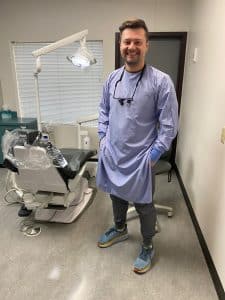 This blog is cross posted from the American Dental Therapy Association’s blog.
This blog is cross posted from the American Dental Therapy Association’s blog.
The ADTA introduces our treasurer, Mark Kobylinsky! Mark holds dual licenses in dental therapy and dental hygiene, with nine years as a dental hygienist and one year as a dental therapist. Mark received his dental therapy license from Oregon in November 2022 when it began issuing licenses. He is one of 13 licensed dental therapists currently working in the state. Currently, Mark works at Willamette Dental, located in the heart of Southeast Portland, Oregon.
Mark has a unique experience with a dual license, integrating the roles of a hygienist and dental therapist. He differentiates these roles by explaining that while hygienists primarily focus on periodontal teeth cleanings and restoring teeth after the doctor’s preparatory work, dental therapists train to perform dental drilling and fillings. Furthermore, dental therapists can diagnose patients, execute simple extractions, and provide treatment.
Mark received his dental therapy license in Oregon through Dental Pilot Project #300, which facilitated the training of existing restorative hygienists in new dental therapist responsibilities. This initiative brought dental services to underserved communities in Oregon. Mark found his background as a dental hygienist invaluable during his transition to becoming a dental therapist, as it provided a sense of familiarity and a strong foundation for his expanded role.
One of Mark’s favorite parts of being a Dental Therapist is broadening access to oral healthcare and, more importantly, helping patients in need. He stresses the collaborative nature of dental teams, emphasizing that every member contributes to a patient’s well-being. Mark finds satisfaction in helping patients who, due to insurance limitations, cannot access traditional dentists in Oregon. Many dentists do not accept Oregon State Health Insurance, and consequently, Mark plays an essential role in ensuring that about 100 patients receive imperative oral care.
Mark’s role as a dental therapist extends beyond clinical duties; he supports patients in overcoming their fears and anxieties about dental treatments. He shares his favorite memory early in his career when he participated in “Gift Kids a Smile Day.” During this event, a child with a painful abscess in a baby tooth required Mark’s attention. Mark successfully extracted the tooth, leaving the child overjoyed and satisfied. This experience highlighted the importance of empathetic care and reassurance during dental procedures, especially for fearful patients.
One common misconception about dental therapy is that it competes with traditional dentistry, potentially diverting patients. However, dental therapists are an integral part of the dental team, collaborating with dentists and benefiting their practice. Dental therapists facilitate the dentist’s ability to focus on complex procedures while handling more straightforward tasks, therefore expanding the dentist’s schedule to accommodate patients in need of extensive treatments.
Dental therapy is not a replacement for traditional dentistry but a valuable addition to oral healthcare teams. Mark compares dentists to quarterbacks, guiding the team while dental therapists, hygienists, and dental assistants are essential players. Together, they optimize patient care and fulfill a patient’s oral healthcare needs.
In pursuing a brighter future for oral healthcare, dental therapists are the pathway to increasing accessibility and quality of care for all. Mark’s dedication emphasizes the transformative impact dental therapists have in expanding oral healthcare services to underserved communities and helping patients obtain and maintain healthy smiles.